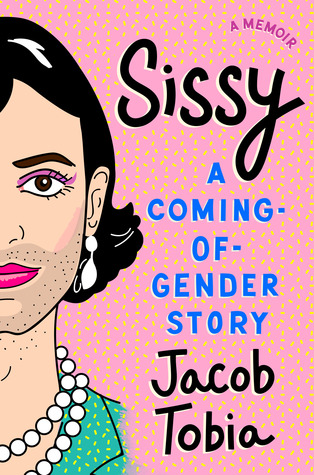I first bought Sissy back in March when the book’s subtitle, “A Coming-of-Gender Story,” caught my eye. Then, it sat on my to-read shelf for weeks, because even though I wanted to read it, I continued to put it off, though at first, I didn’t truly know why.
Slowly, reluctantly, I came to understand it. Every time I looked at my shelf, my gut would clench over the title: Sissy. It’s a negatively-charged word for me, a trigger word, one that is tied to some messy, complicated memories from my childhood in the 80s. The word calls to mind many times when I was bullied, or when I witnessed bullying at school or in our neighborhood. Some of it had to do with gender-policing; the neighbor boys would call my brother a sissy for not liking mud or for not wanting to hurt animals, a very real and disturbing pastime in our hometown.
But some of it was just kid-level teasing. ‘Don’t be a sissy’ meant ‘don’t be a coward’, aka, ‘don’t be a girl. As a daredevil child, sissy was the lowest name anyone could call me. It became a challenge word, like the word chicken for Marty McFly, only less funny, something that, to this day, stirs rage and nausea in my stomach
Then later this past spring, I interviewed Keri Rene Fuller from the cast of Cats, who told me that our job as humans is to see the world from as many varied points of view as possible. She said we should embrace stories that are different from our own in order to gain a better understanding of the world around us.
Then came Pride Month. I bit down and decided that Keri Fuller is right. The time had come to confront these demons. I needed to set my prejudices toward the word sissy aside and embrace the subtitle of this book, because seeing the world from the point of view from someone who is gender non-conforming is about as far from my CIS point of view than I can imagine.
Although, it’s not as far from home as all that. My child identifies as gender non-binary and has from a very young age. My best friend also deals with gender identity issues that have continued to cause anxiety and feelings of guilt for them their entire life. So, this book helped me greatly in seeing what the world looks like for my child and my best friend.
To say that this book changed me is putting it lightly. It moved me. It helped me reclaim the word sissy as something lovely and soft and feminine, in which femininity does not equal weakness, as that playground taunt would have us all to believe.
EVERYONE should read this book. Every person, right now, today.
And I think everyone should read this part over and over again until it becomes bedrock for our society:
“If you’re interviewing a person of difference for a job and you don’t share their identity, the onus is on you to go out of your way to make sure they are comfortable with you. The onus is on white people to ensure that people of color are comfortable. The onus is on CIS/hetero folks to ensure that queer and trans folks are comfortable. The onus is on men to ensure that women know that they’re supported. In any situation where you have both identitarian and positional power, in which the interviewer is also the person with the dominant identity, it is the responsibility of the interviewer, not the interviewee, to ensure that the interviewee feels supported and encouraged to express themselves.”
As a CIS/Het/White person, it is my responsibility to use my privilege to help those who are not the dominant identity to feel included. As a white woman, it is my responsibility to help other women, especially women of color, to feel supported.
It’s my belief that if we do this, we make the world a better place. I’m very grateful to Jacob Tobia and their courage for putting this book into our lives. My child and my best friend needed this book, and though I didn’t know it at the time, I did, too.
